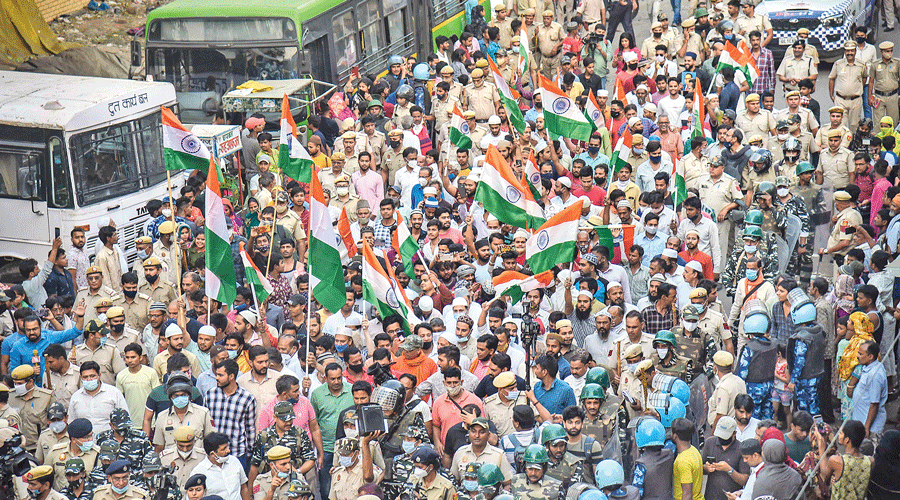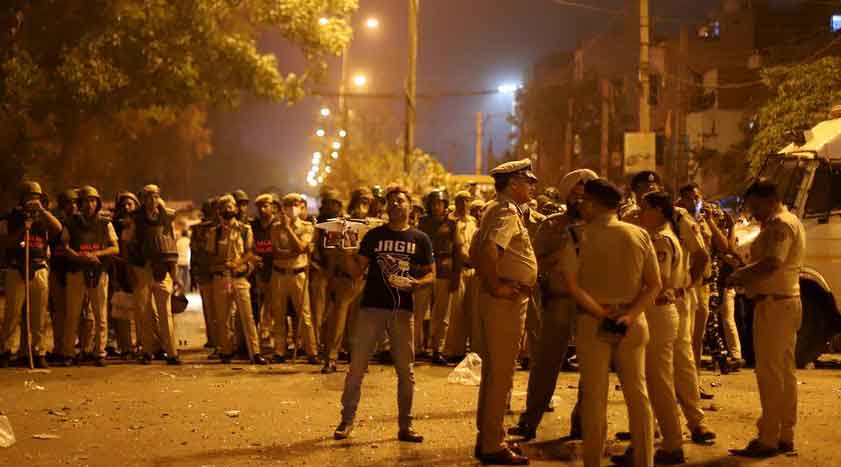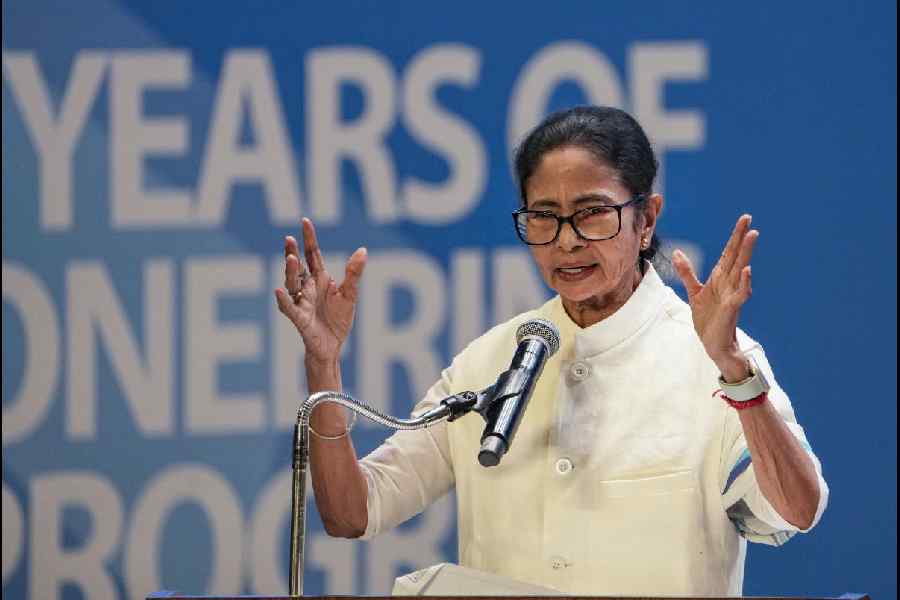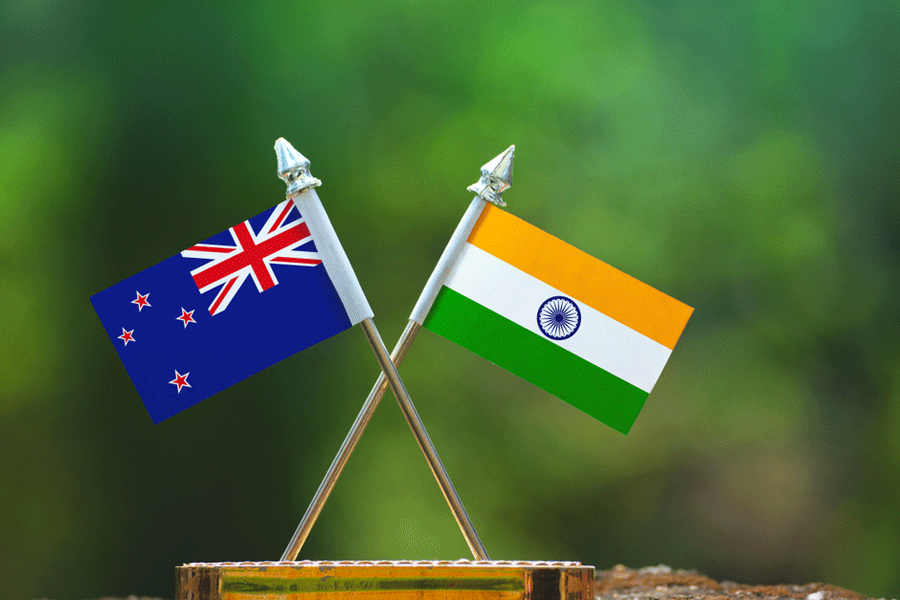Muslim residents of Jahangirpuri have accused Delhi police of a “one-sided” investigation into the April 16 communal clash, alleging the force was portraying the minorities as “aggressors” and treating the armed provocateurs from the Hanuman Jayanti procession with “kid gloves”.
“The police are selectively targeting Muslims in the name of investigation. The aggressors who stopped in front of the mosque brandishing swords and pistols and shouted abusive slogans against Muslims are being treated with kid gloves,” Akbar, a resident, told The Telegraph.
Delhi police, who report to the Union home ministry, had faced charges of biased investigation also after the February 2020 riots, with the Delhi minorities commission accusing them of being “complicit and abetting the attacks” and later tending to arrest the victims rather than those they accused.
Of the 25 people arrested in connection with the April 16 clash, 20 are Muslim. Among the arrested are two minors, both Muslim. The police have invoked the stringent National Security Act against five among those arrested — all Muslims.
The NSA allows preventive detention for up to a year, even without specific charges, and is often invoked to keep behind bars accused who have received bail in a related case.
Both Hindu and Muslim residents had earlier told this newspaper — seeking anonymity because they didn’t trust the police — that some “outsiders” among the processionists had entered a mosque during namaz, shouted abuse at Muslims and tried to plant a saffron flag in the courtyard. This led to a skirmish with both sides throwing stones.
“It’s clear the design was to foment trouble. Instead of arresting these provocateurs under the NSA, the police have said the Muslims were the conspirators. Had Muslims gone to a temple and created a ruckus?” Ahmed Ali, a Jahangirpuri resident, said.
The FIR that the police registered on their own does not mention any provocation and says the violence broke out around 6pm after a man named Ansar and his associates (those now slapped with the NSA) began arguing with the processionists.
Ali said: “The police have not yet revealed how many of the processionists seen in videos brandishing pistols and swords have been arrested.”
A resident who declined to be named said that after entering the mosque, some of the processionists also threw stones at the faithful.
“After that, Muslims too retaliated with stones. What would you do if someone chanted communal slurs, forcibly entered your religious place and tried to hoist a flag?” he said.
Confronted with the residents’ allegation of a biased probe, a senior police officer told this newspaper: “We are conducting a fair probe to ensure those involved in the violence, irrespective of their class, creed and religion, get exemplary punishment.”
Police lapses
Muslim residents of Jahangirpuri aren’t alone in questioning the police. Several retired intelligence and police officers too had earlier accused the police of a “dubious” role, suggesting their failure to take timely action against armed and belligerent participants from the unauthorised procession facilitated the violence.
On April 18, CPM politburo member Brinda Karat wrote to Delhi police commissioner Rakesh Asthana, urging him to act against officers who had allowed the processionists to carry weapons, failed to arrange adequate security, let the procession stop before the mosque, and were conducting a biased investigation.
The charges in the letter echo the report of a fact-finding team of Left parties.
Asthana has argued that people from “both communities” have been arrested. He has denied any attempt by the processionists to plant a saffron flag at the mosque.
The police brought another cloud on themselves on April 18 by appearing to buckle under a Vishwa Hindu Parishad (VHP) threat to launch “a battle” if any action was taken against its activists in connection with the Jahangirpuri violence.
Reports say the police had initially registered an FIR against the organisers (VHP and Bajrang Dal) for holding the procession without permission and arrested Prem Sharma, a local VHP leader.
After the VHP threat, the police said the penal section 188 (disobedience to order duly promulgated by public servant) was a bailable offence and that Sharma had joined the investigation and been allowed to leave after questioning.
The FIR on the violence invokes the charges of attempt to murder, criminal conspiracy, rioting as well as other provisions of criminal law and the Arms Act.
‘Kill’ threat
In an interview to the news portal The Wire, a woman who introduces herself as Hindu and a Jahangirpuri resident says in a video: “They (processionists) provoked Muslims by shouting abusive slogans at a time they were preparing to break their fast. Who will tolerate this? They were saying, ‘We will kill Muslims… will not allow them to live here’.
“This was so bad. Muslims did not go inside temples and say this. We (Muslims and Hindus) live here very peacefully…. I have been living here for several years but never encountered any such thing. Muslims are being harassed now.
“Members of the Bajrang Dal were armed with guns and swords and the Muslims were unarmed. But when they (Muslims) were attacked, they too would protect themselves. Some people are trying to spoil social harmony because of their dirty politics.”
Riot bias
Two years ago, the Delhi police’s handling and investigation of the February 2020 riots had earned condemnation from the Delhi minorities commission and Opposition parties, and invited reprimands from courts.
The police were accused of helping Hindu rioters, arresting mostly Muslims, and not acting against BJP leaders such as Kapil Mishra, Parvesh Verma and Union minister Anurag Thakur, who allegedly delivered hate speeches.
Several videos had purportedly shown the police either standing and watching mobs run amok or, in some instances, accompanying them as they raided Muslim neighbourhoods.
A fact-finding report by the CPM in December that year had said: “…The offensive was from the Hindutva mobs while the other side, in the main, was desperately trying to save themselves from such attacks…. In almost all areas, there is video evidence of the police siding with the Hindutva mobs.”
On February 27, 2020, Justice S. Muralidhar of Delhi High Court had pulled up the police and given them a day to decide on filing FIRs against hate speeches by BJP leaders. Justice Muralidhar was transferred hours later, triggering controversy.
Afterwards, the police told a trial court that prima facie, no cognisable offence had been found to justify the lodging of FIRs against Thakur or Verma.
Last year, a trial court slapped a fine of Rs 25,000 on the Delhi police for their “callous and farcical” investigation into one of the riot cases and said the force had “miserably failed in their statutory duties in the case”.











